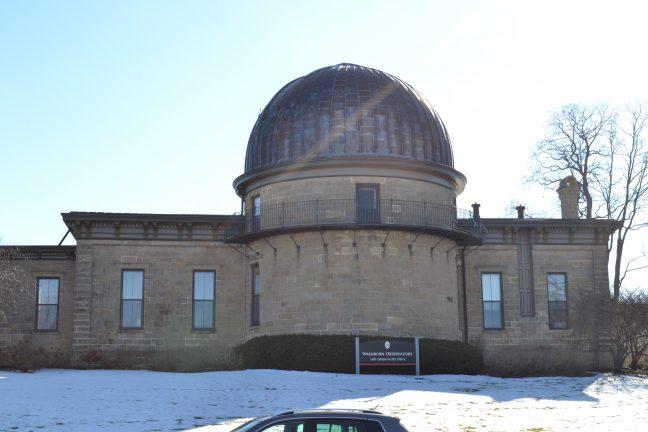Exhibiting the vast reaches of the universe, guest speaker Dean Regas from the Cincinnati Observatory gave a presentation at the University of Wisconsin Space Place Tuesday.
“So the universe is vast,” Regas said. “It is humongous. It is hard to wrap your brain around. It’s hard to really get a feel for it, but I’m going to do my best to get you a feel for where you are in the universe and how big it is.”
Using software called Mitaka to tour the cosmos, Regas started his journey on Earth. He proceeded to show the audience the commonly known planets within the solar system, from Venus and its toxic environment, to Saturn and its 82 moons. Even Pluto, which Regas said is no longer a planet due to its tilted orbit, ice composition and its similarity in size to thousands of other things orbiting the sun.
Beyond the basic model of the solar system, Regas expanded to show things orbiting our sun more distant than Pluto, like the solar system body Sedna.
Discovered about 15 years ago, Sedna orbits our sun in an elongated and slow manner that may be caused by an undiscovered mass called planet nine, Regas said.
Sedna takes about 12,000 years to orbit the sun, but beyond that lies a region where long period comets live, called the Oort Cloud, Regas said
“Our whole solar system has to reach all the way up to about one light-year,” Regas said. “That’s the distance light travels in one year, or almost 6 trillion miles. So comets can go all the way out here, and the gravity of the sun can still pull it back in for a very long orbit.”
The next closest star system is Alpha Centauri, Regas said, which consists of three stars. One could watch the sunset on a planet in this system and see another one rise moments later.
Regas proceeded to zoom out of the stars around Alpha Centauri to show the Milky Way Galaxy.
UW affiliates create Navajo words, hope to spark science communication
“All the stars you see at night are nothing,” Regas said. “They’re just one tiny piece of an arm of our galaxy.”
After showing a rendering of the black hole at the center of the Milky Way, Regas started to show tons and tons of colorful, shining galaxies. These galaxies include anything from dwarf galaxies and irregular galaxies to Andromeda, which has about one trillion stars and can be seen in the east of the night sky with a telescope, he said.
In the final leap of the presentation, Regas zoomed all the way out to show the known extent of the universe. He said anything could lie outside of our universe, even other universes.
Regas concluded by zooming all the way back on to the Earth. He said the human race is a small species living on a small rock in a mediocre galaxy, but understanding the vastness of the universe is an incredible accomplishment.
“Look at what we’ve done,” Regas said. “Us teeny tiny creatures made a map of our entire universe, and we barely even left the Earth. We sent some people to the moon, but that’s about it. We made a whole map of the universe. Astronomers are the craftiest people and they can make these instruments that can study things billions of light years away.”


















